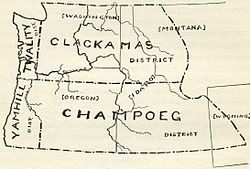Champooick District
| Provisional Government of Oregon | ||||||||||
| Part of the United States (1846–1849) | ||||||||||
|
||||||||||
|
Original districts of the government with the eventual U.S. borders and states
|
||||||||||
| Capital | Oregon City | |||||||||
| Languages | English, French |
|||||||||
| Government | Republic | |||||||||
| Executive | ||||||||||
| • | 1841–1843 | Supreme Judge Ira Babcock | ||||||||
| • | 1842–1843 | Chairman of the Committee at Champoeg Meetings Ira Babcock | ||||||||
| • | 1843–1845 | Executive Committee | ||||||||
| • | 1845–1849 | Governor George Abernethy | ||||||||
| Legislature | Single chamber | |||||||||
| History | ||||||||||
| • | Appointment of constitutional committee and election of Supreme Judge at Champoeg | February 18, 1841 | ||||||||
| • | First Wolf Meeting at Champoeg | February 1, 1843 | ||||||||
| • | Second Wolf Meeting at Champoeg | March 6, 1843 | ||||||||
| • | Creation of the Provisional Government at Champoeg | May 2, 1843 | ||||||||
| • | United States Territorial Government arrives | March 3, 1849 | ||||||||
| Currency |
Beaver skins, Wheat, U.S. dollar, Mexican peso, Peruvian real, |
|||||||||
|
||||||||||
The Provisional Government of Oregon was a popularly elected settler government created in the Oregon Country, in the Pacific Northwest region of North America. Its formation had been advanced at the Champoeg Meetings since February 17, 1841 and it existed from May 2, 1843 until March 3, 1849, and provided a legal system and a common defense amongst the mostly American pioneers settling an area then inhabited only by the many Indigenous Nations. Much of the region's geography and many of the Natives were not known by people of European descent until several exploratory tours were authorized at the turn of the 18th and 19th centuries. The Organic Laws of Oregon were adopted in 1843 with its preamble stating that settlers only agreed to the laws "until such time as the United States of America extend their jurisdiction over us." According to a message from the government in 1844, the rising settler population was beginning to flourish among the "savages", who were "the chief obstruction to the entrance of civilization" in a land of "ignorance and idolatry."
The government had three branches that included a legislature, judiciary, and executive branch. The executive branch was first the Executive Committee, consisting of three members, in effect from 1843 to 1845; in 1845, a single governor position was created. The judicial branch had a single Supreme Judge along with several lower courts, and a legislative committee of nine served as a legislature until 1845 when the Oregon House of Representatives was established.
A series frontiersmen assemblies were held over several years across the Willamette Valley, with many on the French Prairie at Champoeg. The death of prominent settler Ewing Young on 9 February 1841, who left neither a will or had an heir in Oregon Country, left the future of his property uncertain.Jason Lee chaired the first meeting organised to discuss the matter on the 17th. He proposed the creation of an authority over the pioneers centered on a governor.French-Canadian settlers blocked the measure and instead a probate judge and a few other positions were appointed.
...
Wikipedia


